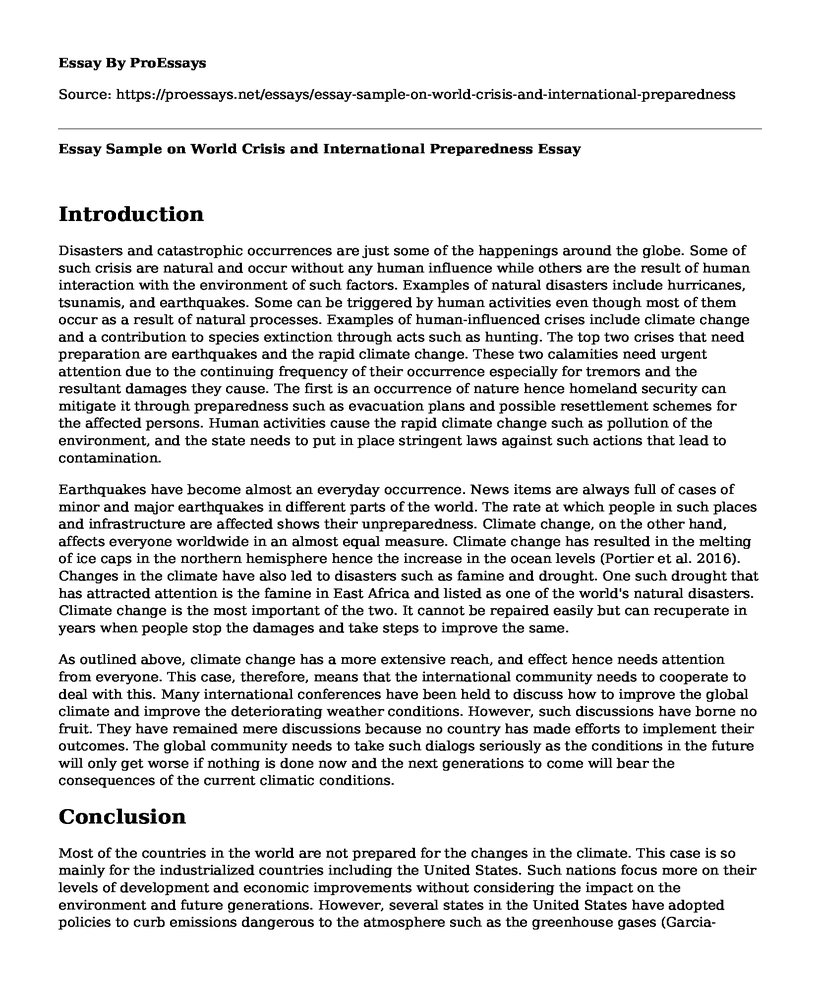Introduction
Disasters and catastrophic occurrences are just some of the happenings around the globe. Some of such crisis are natural and occur without any human influence while others are the result of human interaction with the environment of such factors. Examples of natural disasters include hurricanes, tsunamis, and earthquakes. Some can be triggered by human activities even though most of them occur as a result of natural processes. Examples of human-influenced crises include climate change and a contribution to species extinction through acts such as hunting. The top two crises that need preparation are earthquakes and the rapid climate change. These two calamities need urgent attention due to the continuing frequency of their occurrence especially for tremors and the resultant damages they cause. The first is an occurrence of nature hence homeland security can mitigate it through preparedness such as evacuation plans and possible resettlement schemes for the affected persons. Human activities cause the rapid climate change such as pollution of the environment, and the state needs to put in place stringent laws against such actions that lead to contamination.
Earthquakes have become almost an everyday occurrence. News items are always full of cases of minor and major earthquakes in different parts of the world. The rate at which people in such places and infrastructure are affected shows their unpreparedness. Climate change, on the other hand, affects everyone worldwide in an almost equal measure. Climate change has resulted in the melting of ice caps in the northern hemisphere hence the increase in the ocean levels (Portier et al. 2016). Changes in the climate have also led to disasters such as famine and drought. One such drought that has attracted attention is the famine in East Africa and listed as one of the world's natural disasters. Climate change is the most important of the two. It cannot be repaired easily but can recuperate in years when people stop the damages and take steps to improve the same.
As outlined above, climate change has a more extensive reach, and effect hence needs attention from everyone. This case, therefore, means that the international community needs to cooperate to deal with this. Many international conferences have been held to discuss how to improve the global climate and improve the deteriorating weather conditions. However, such discussions have borne no fruit. They have remained mere discussions because no country has made efforts to implement their outcomes. The global community needs to take such dialogs seriously as the conditions in the future will only get worse if nothing is done now and the next generations to come will bear the consequences of the current climatic conditions.
Conclusion
Most of the countries in the world are not prepared for the changes in the climate. This case is so mainly for the industrialized countries including the United States. Such nations focus more on their levels of development and economic improvements without considering the impact on the environment and future generations. However, several states in the United States have adopted policies to curb emissions dangerous to the atmosphere such as the greenhouse gases (Garcia-Menendez et al. 2015). However, despite the steps to reduce pollution hence the effects of climate change, the United States is not up to the adverse effects of climate change. It cannot provide for its citizens wholly in the occurrence of the full force of climatic changes. The efforts to reduce pollution needs explicit implementation and enforcement mechanisms. Besides, it should also put in place punitive laws for persons who do not comply with such provisions.
References
Garcia-Menendez, F., Saari, R. K., Monier, E., & Selin, N. E. (2015). US air quality and health benefits from avoided climate change under greenhouse gas mitigation. Environmental science & technology, 49(13), 7580-7588.
Portier, C. J., Thigpen, T. K., Carter, S. R., Dilworth, C. H., Grambsch, A. E., Gohlke, J., ... & Maslak, T. (2017). A human health perspective on climate change: a report outlining the research needs on the human health effects of climate change. Environmental Health Perspectives/National Institute of Environmental Health Sciences.
Cite this page
Essay Sample on World Crisis and International Preparedness. (2022, Jun 30). Retrieved from https://proessays.net/essays/essay-sample-on-world-crisis-and-international-preparedness
If you are the original author of this essay and no longer wish to have it published on the ProEssays website, please click below to request its removal:
- Issues of Air Pollution - Research Proposal
- Texas Economic Crunch Annotated Bibliography Paper Example
- Essay Example on Mexican-American War: A History of Conflict and Refuge
- Nissan Motors: Surviving Japan's 2011 Triple Catastrophe - Case Study
- Essay Example on History of the US: From Mexico to Freedom from Slavery
- Competitive Advantage with Malcolm Baldrige National Quality Award - Essay Sample
- Free Report Sample on Education SWIRL & Professional Development







